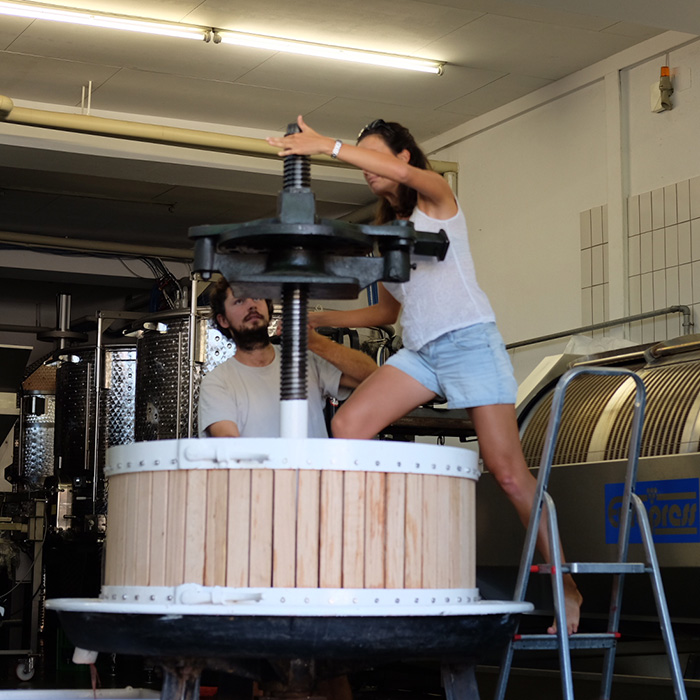What to do with the Gutedel? That was one of the questions the brothers Christoph and Johannes Schneider asked themselves when they took over the winery am Schlipf in Weil am Rhein, Baden, from their parents a few years ago. Should they follow the other winemakers on their path? "There are two currents here in the Markgräflerland," says Christoph Schneider. One is oriented towards Switzerland. There, the Gutedel is called Chasselas, is often matured in wooden barrels and tastes rather opulent. In the other current, winemakers look towards Burgundy, the Gutedel can be reminiscent of Chardonnay there - if they are well made.
"For us, neither felt right," Christoph Schneider continues. "We asked ourselves what makes the Gutedel for us." The answer was quickly found. "Lightness and little acidity," says Johannes Schneider. The next question, which was not quite as easy to answer, was how the wine could gain complexity. Because that is not what Gutedel is known for so far.
The brothers began experimenting under the label "Haus Gupi" - the name stands for Gutedel and Pinot. Whole bunch pressing, carbonic maceration, long lees ageing and little to no sulphur are the keywords. The result was three fascinating and completely independent wines. This created a headwind. "That's not Gutedel at all, we were told," says Christoph Schneider. For him and his brother, however, the wines are exactly that: an independent, Baden interpretation of the grape variety. Gutedel is 97 percent grown in Baden, on 1,057 hectares in Germany. There is also a little in Saale-Unstrut, a few vines in Saxony and in the Palatinate.
 Gentle whole bunch pressing for the Gutedel
Gentle whole bunch pressing for the GutedelFor the Schneider brothers, Gutedel is a wine that can have a future. And not only because it fits the spirit of the times. It has a special characteristic that could make it a winner in the face of global warming. Because the Gutedel stops producing sugar at some point during the ripening of the grapes: It stops at a maximum of 85 degrees Oechsle. Even in hot years, the winegrowers can leave the grapes hanging until the end of the harvest - and still press a wine with only twelve percent alcohol by volume. Some of the Schneiders' Gupi wines are even below ten, but they do not lose any of their flavour and texture.
The two could sell their Gupi wines as natural wines: both the style and the taste profile fit. But they deliberately do not do so. "The discussion about natural wine often has something divisive about it, we don't have to take part in that," says Christoph Schneider. The experiences they have made with Gupi continue to flow into the normal wine lines as well. "Our parents have always made elegant wines. We refine that, become more extreme here and there," says Johannes Schneider. They use less sulphur in all their wines and extend the lees ageing. For example, the simplest Gutedel, the "Vom Kalkstein", lies on its lees for 16 months, the single vineyard "Stiege" for 18 months.
The farm's Gutedel costs between 9.20 euros and 28 euros. Compared to what is usually charged for Gutedel, that is a lot. Not when measured against the effort and quality. "Customers never ask about the price," says Johannes Schneider. "Whoever buys our wines obviously does so quite consciously."
Anyone who ponders the price at Gutedel quickly ends up at Edeltraud and Hanspeter Ziereisen in Efringen-Kirchen, which is also in Baden. They sell the most expensive and probably also the best Gutedel in the world, the "10hoch4". The name is derived from the vine density of the vineyard where the vines for the wine are planted - 10,000 on one hectare.
The "10hoch4" costs 125 euros and Hanspeter Ziereisen laughs uproariously when he tells us that his fellow winemaker Klaus Peter Keller once considered the wine to be an outstanding Chardonnay from Burgundy.
Yet it took quite a while for Ziereisen to discover his love for Gutedel. And this despite the fact that in earlier times the wines were considered to be outstandingly good and very ageable. "The best vintages matured in barrels for up to 100 years," says Ziereisen. When he founded his winery in 1991, those times were long gone. "Everything was cold-fermented with pure-bred yeasts and tasted the same. We didn't like that at all," Edeltraud Ziereisen remembers.
Over the years, the two developed their own style, which is based above all on omission. No pure cultured yeasts, no filtration, no stainless steel. For this, Ziereisen is celebrated by wine freaks and condemned in Baden - his wines have not been given an official test number for a long time. He bottles them all as Landwein and is pleased with the highest ratings.
He particularly likes the diversity of the grape variety: "Chasselas is one of the very few varieties that can do everything, from a "Zechwein" like our Heugumber to a top wine like the '10hoch4'." He is currently working on a Gutedel, which may even surpass his top wine one day. The Ziereisen family bought a steep vineyard to plant with old Gutedel vines from all over the world. They found some on the Rhône, in Hungary, Romania, Switzerland, but also in Australia, on the Loire and in Spain. There are supposed to be 20,000 vines on one hectare in this vineyard. "That," says Ziereisen with a grin, "will be exciting."
Cover photo: Chasselas grape © Doris Schneider, Julius-Kühn-Institut (JKI)